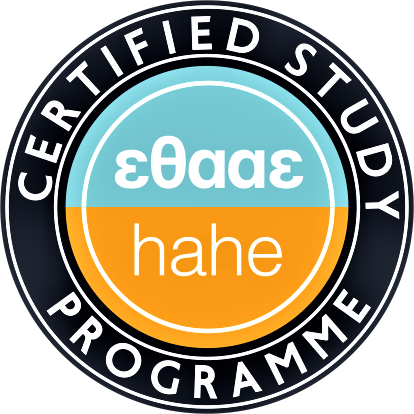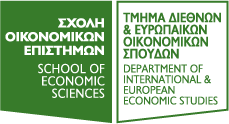Description
Postgraduate studies at the Athens University of Economics and Business
The Athens University of Economics and Business was established in 1920 and since then has been at the forefront in its field of expertise amongst the best Greek and European universities. It was the first university in Greece to organise modern programmes of postgraduate studies at the Master’s level.
The Department of International and European Economic Studies (DIEES) introduced a Postgraduate Programme in 1994. To this day, those who have received a PhD from this programme have achieved publications in major scientific journals in their field and the majority is employed as teaching and research staff in Greek and foreign universities, research institutions, banks and international organisations. Today over 20 students are enrolled in the Department’s PhD programme.
Eligibility criteria for applying to the DIEES PhD Programme
Anyone who holds a Master's degree or expects to obtain a Master's degree within a period of six months from the date of application may apply to the Department’s PhD programme. Applications are submitted in spring of each year. The specific dates for submission are posted on the department website and can also be obtained from the programme secretary.
All decisions concerning the enrollment of students and the content of the PhD programme (course tracks, qualifying exams, teaching staff, supervisors, advisory committee, etc.) are made by the General Assembly of Special Composition (comprised of members of the faculty that have formally been assigned to assess candidates and determine the framework of the PhD programme), after a proposal by the Committee of Postgraduate Studies.
Course Tracks of the DIEES PhD Programme
Students admitted to the postgraduate programme can choose, depending on their background, one of two course tracks available in the programme. The first track includes a series of courses in economic studies with a focus on economic theory and quantitative methods. The second provides courses on economic studies, as well as courses from alternative disciplines taught in the department (political science, law).
Track 1
Students attend courses for two semesters (winter semester: September-December, spring semester: February-May).
Winter semester courses:
- Topics in Microeconomics I
- Topics in Macroeconomics I
- Advanced Mathematics
- Statistics
Spring semester courses:
- Topics in Microeconomics II
- Topics in Macroeconomics II
- Topics in Econometrics
- Topics in Economics and Finance
Courses are taught in English by staff members of the Department and Visiting Scholars from foreign institutions, including Yale University, University of Chicago, and other well-known U.S. and European Universities.
Student attendance is mandatory in all courses. If the number of absences exceeds 30% of lectures, this results in failing the course. Exams take place at the end of each semester. (The courses listed above can be offered as elective courses to students of the DIEES Master’s programme in coordination with the Committee of Postgraduate Studies).
In September of each year, students attending courses in Track 1 participate in qualifying exams in four areas of study:
- Microeconomics
- Macroeconomics
- Mathematics and Statistics
- Econometrics and Topics in Economics/Finance
The final mark achieved in each course depends on marks obtained in each exam period. In particular, 25% of the final mark is determined by marks obtained in the first semester, 25% by marks in the second semester, and 50% by marks in September.
The marking system is based on a scale of 0 to 100: a mark of 100 corresponds to the highest achieved mark (excellent) and a mark of 50 is considered the lowest passing mark. Students that receive a final mark below 50 in two or more courses are automatically excluded from the programme. Students that receive a final mark below 50 in only one course can repeat the exam in that course, which will account for 50% of their final mark. If again they receive a final mark that is below 50, they are automatically excluded from the programme.
Students that have been accepted in the Department’s PhD programme can choose not to attend courses only if they have attended a set of PhD programme courses equivalent to that described above and after the Committee of Postgraduate Studies gives its consent. However, students must still take the qualification exams held in September, immediately after they are accepted in the programme. Marks received in these exams account for 100% of final marks. If students fail to pass some of these exams, they are obliged to attend the relevant courses in the Department’s PhD programme.
Track 2
Students must attend and pass eight courses offered by the department. Two of these courses, namely Microeconomics and Macroeconomics, are mandatory and are taught during the winter semester in the course track “International Economics and Finance” of the DIEES Master’s programme. Also mandatory is an undergraduate-level course in econometrics, which is proposed by the General Assembly of Special Composition, after a recommendation by the Committee of Postgraduate Studies. The same procedure applies for determining the remainder of the department’s undergraduate or postgraduate courses that students are obliged to attend in this track.
Students of Track 2 that have passed some of the mandatory courses must attend and pass the remainder of courses (within a total of eight), which are proposed by the Committee of Postgraduate Studies and approved by the General Assembly of Special Composition. Students are obliged to pass all eight courses (that is, to obtain a mark greater or equal to 50 in all courses) and at the same time attain an average mark that is greater or equal to 70. If they do not achieve this, they can choose four out of the eight courses and repeat exams only once within a month of the first exam. After repeating the exam, if students still fail to pass all exams and produce an average equal to or above 70, they are automatically excluded from the programme.
Preparation and Evaluation of the PhD Dissertation
During the first two semesters of the PhD programme, students are advised to consult members of the department’s faculty in order to make a preliminary choice of their dissertation thesis and supervisor. (For details on the research interests of the department’s faculty, please see the department website.) However, students cannot start working on their dissertation, unless they have passed their qualifying exams in Track 1 or Track 2.
After succeeding in their qualifying exams, students are required to submit a dissertation proposal within a period of three months. The proposal must be in writing and should be approved by three faculty members that comprise the “Three-member advisory committee” appointed by the General Assembly of Special Composition. One of the members of this committee takes on the duties of the “Supervisor”. After the proposal is approved, the PhD candidate begins research and prepares his/her dissertation. When the members of the “Three-member advisory committee” decide that the candidate has completed his/her dissertation (within a minimum of three years and a maximum of five years from its approval), they offer their consent for submission of the dissertation for final evaluation.
The Examining Committee is responsible for evaluating the candidate’s dissertation and consists of seven members. Three of those members comprise the “Three-member advisory committee”. The rest of the members are selected by the General Assembly of Special Composition and may belong to a department of another Greek or foreign University. A student is awarded a PhD diploma when his/her dissertation has been evaluated by the Examining Committee and approved by at least five of its members.
Exemption from tuition fees
PhD candidates are exempted from tuition fees provided they offer supplementary services to the department, which include assistance to members of the faculty in tutorials, exam invigilation, and grading papers.





